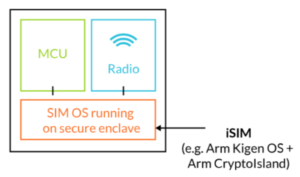IoT Gets a Security Upgrade

Processor specialist Arm is extending its push into the Internet of Things security market with a device authentication effort based on the cellular technology mainstay, the SIM card.
Meanwhile, a batch of IoT device certification and network gateways also surfaced this week as IoT vendors shift their focus to securing the emerging device network.
The U.K. chip intellectual property vendor said Wednesday (Feb. 21) it is combining SIM functionality with a cellular modem and microcontroller into a secure system-on-chip as part of an IoT identity effort. The on-chip SIM’s operating system runs on an “enclave” based on Arm’s “secure core” approach rolled out last fall.
With estimates of billions of IoT devices and an estimated 4.4 billion cellular devices by 2025, Arm is betting that established SIM card technology will provide the security and reliability needed to scale on far-flung cellular networks.
SIM (which stands for “subscriber identity mobile”) “is the root of cellular authentication,” said Chet Babla, vice president of Arm’s low-power wireless network unit. “Identity is a critical security principle” for deploying networked IoT devices, he added.
Arm also unveiled SIM functionality for IoT chip designs dubbed Kigen. The family includes an operating system software stack that complies with the dominant GSM wireless standard. The product family also includes a remote provisioning server feature aimed at IoT and other celluar platforms.
Kigen provides on-chip SIM functionality to IoT devices while conforming with a security architecture released by ARM last October that includes IoT hardware and firmware. Arm said its integrated approach to cellular IoT is aimed at network operators along with chip and module providers.
Babla said the Kigen operating system is being tested now by its IoT partners. Along with parent company Softbank (TYO: 9984), other early backers of the on-chip SIM approach include wireless carriers BT (NYSE: BT) and Sprint (NYSE: S).
Earlier this week, AT&T (NYSE: T) announced it is working with Ericsson (NASDAQ: ERIC) on new IoT services including device certification offering for testing and verifying IoT devices to meet regulatory requirements.
Separately, Canonical announced mid-week that its IoT operating system, Ubuntu Core, will be deployed across enterprise IoT gateways from Rigado, an IoT networking specialist. The combination is intended to secure and scale edge connectivity deployments.
IoT security is becoming more urgent with the exponential growth of connected devices. Gartner Inc. (NYSE: IT) estimated last year that 8.4 billion devices would be connected by the end of 2017, a 31 percent increase from the previous year. Hence, the growing requirement for cheap and secure network connections that include device authentication. Among them is Arm’s integrated SIM approach.
“From 2018 onwards, cross-industry devices, such as those targeted at smart buildings (including LED lighting, HVAC and physical security systems) will take the lead as connectivity is driven into higher-volume, lower cost devices,” Gartner said.
In response, chip vendors like Arm are betting that demand for secure, inexpensive and long-lasting devices with built-in authentication features will grow along with these enterprise IoT deployments.
--Editor's note: This story has been updated.
Related
George Leopold has written about science and technology for more than 30 years, focusing on electronics and aerospace technology. He previously served as executive editor of Electronic Engineering Times. Leopold is the author of "Calculated Risk: The Supersonic Life and Times of Gus Grissom" (Purdue University Press, 2016).











